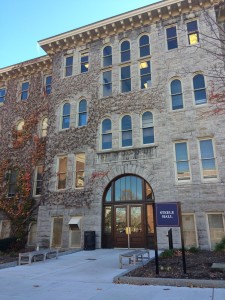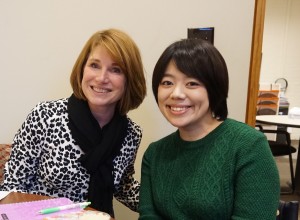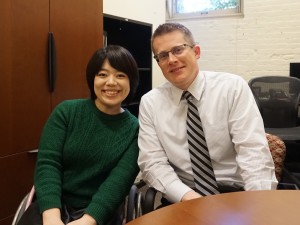This article is also available in: 日本語

Equal Opportunity, Inclusion and Resolution Services (EOIRS) is a place which provides reasonable accommodations for staff and faculty with disabilities who work at Syracuse University.
In my previous post, I introduced The Office of Disability Services (ODS). It is for students with disabilities.
EOIRS is for staff and faculty with disabilities.
The reason why those offices are separated is because of the difference each office need to follow in ADA.
EOIRS handles ADA related to title 1 which is employment.
ODS is more under title 3, Public Accommodations.
I had an opportunity to interview Dana Butler (Leaves and Disabilities Accommodation Coordinator) and Aaron Hodukavich (the Director and ADA/503/504 Coordinator).

Dana came from HR background.
She had handled a number of things including disability benefits and accommodations for people coming back from disability.
Since EOIRS was separated from HR, Dana has been working at the current position.
She handles workplace accommodations as well as disability benefits for employees and faculties.
She also handles family medical leave act and the long term disability benefit.

Aaron had worked for a non-profit organization for people with disabilities.
Through site visits, he found issues that the working environment for people with disabilities, for instance the workers are segregated in doing a very simple tasks and often getting paid very little wages for the work etc.
He went to a law school and got more involved disability advocacy.
Now he works as an ADA coordinator and coordinates the universities compliance with the ADA and all the various laws and regulations regarding disability.

All reasonable accommodations are arranged only when a faculty him/herself discloses the disability and ask what he/she needs.
In Japan, when we, people with disabilities, start working, we submit a copy of ID for person with disability to the employer.
After that, the employer would ask what the reasonable accommodations are for us. So this process is totally different in US and Japan.
Furthermore, in many employment situations in Japan, enough reasonable accommodation would not be provided due to the lack of budget.
In Syracuse University, individual department that the employees with disabilities works would pay for that accommodation from their budget.
If the departments do not have enough budget then it goes up to either their school or the college or the broader department.
It has never happened a case that the university has denied accommodation based on because cost too much to comply with ADA.
The university is looking at resources of the entire university not just an individual department.
So if individual department doesn’t have the money to pay for the reasonable accommodations the university needs to find that money elsewhere within the University.

Dana and Aaron said,
The ideal society for people with disabilities would be one with the least amount barriers possible.
By using principles of universal design, we can create spaces and policies that lessen the need for people to have to request individual accommodations.
An environment which is the most accessible for the most amount of people, the less number of people that actually have to work with the office to request individual accommodations.
Community and space where people access freely without the accommodations and not having barriers are really important.
